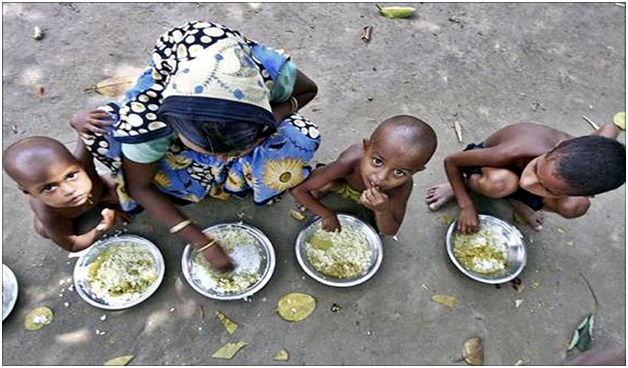Chronic Hunger Might Have a Solution in an Efficient Panchayati Raj

JAIPUR: It was only last month that some of the villages in the Jajpur district in Orissa reported death of malnourished children while the local bodies could not explain the reasons for it. And in some of the poorest tribal districts of India like Jajpur in Orissa or Palamau in Jharkhand, and parts of Rajasthan, the deaths of malnourished and hungry children are just another normal event.
The Public Distribution system (PDS) under the National Food Security Act 2013, responsible for providing subsidized ration to the eligible households suffers presently from 61% exclusion error. This means that more than half of the beneficiaries do not receive their entitled rations.
In several rural pockets deaths due to hunger and chronic starvation can be avoided by strengthening the food distribution and management system.
It is indeed true that one of the main reasons for successful delivery of policies for full benefit to the community lies in the process of decentralisation One of the major focus of the decentralized approach of the Panchayati Raj System is to provide easy access to locally run fair price shops and regulate the food menace in the rural pockets. Additionally the Panchayats should better the stock management protocols of the PDS shops and as well take charge of setting up of a grievance redressal unit to ensure that every eligible beneficiary receive their respective entitlements.
There is a significant relationship between women’s empowerment and nutritional impacts among the rural communities. It is believed that women who have direct control of their families household functions as well as financial independence to change the patterns of diet are more food secure.
In the Panchayati raj act with the independent commission’s for elections there is also a provision for reservation of one third of the total seats for women promoting equal representation at governance levels. It has been previously studied that intervention in food policies is a direct result of a strong women Sarpanches who have decisive powers for better implementation of ration shops.
Unfortunately like the tribal blocks of Rajasthan and many other villages of similar kind, major biases of patriarchy happens in the Sarpanch election. In the south eastern belts of Rajasthan Sarpanch-pati (husband of the women Sarpanch) holds more electoral control and decisive powers than the actual elected women leader. This leads to huge exclusion in women nutrition and food security issues and poorer chances of establishing a proper ration security measures among several households.
In the Chhattisgarh food security model increased inclusion with targeted PDS reforms and active participation of the panchayati system is seen. As per the mandate there exists a structured grievance redressal model that has a network including the gram sabha, village panchayat and the block. This grievance redressal cell ensures that all the eligible households receive their entitled ration with pregnant and lactating women getting their regular incentives.
The Panchayati Raj system in many villages has become a highly dysfunctional system. As per different studies there are only few states that have fully conferred the subjects to the Panchayat’s. This is evaluated by three main indicators which is the devolution in policy, index of devolution in practice and policy adjusted against the practice.
Among the list Maharashtra, Tamil Nadu and Kerala top the list. Unfortunately in many backward states and tribal districts the fiscal decentralisation does not match the development outcomes. In such tribal pockets there is very poor resource mapping of funds among the Panchayati system with poor fund allocation and transfer methods by the state.
The process of local self-governance comprising of the Panchayati system can only be strengthened when the centre and state decide to transfer all the important subjects to the local bodies with political and financial stabilities. In the areas of food security a well-managed Panchayati system can be itself a major reform in the policy architecture.
It is indeed true that a hungry nation can only contribute half skilled labour force to the economic development map. Thus it is very important to advocate the right to food and an equality based growth map.



